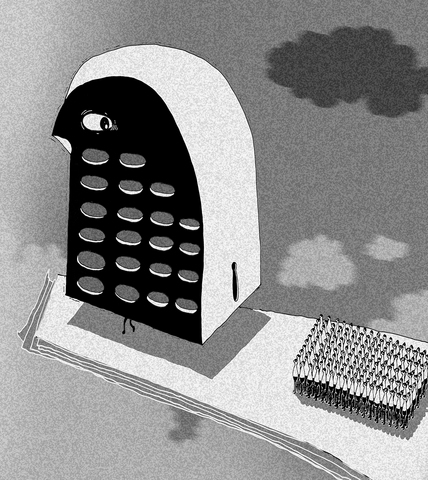When EU political leaders meet for their summer summit tomorrow, some of them are bound to recall an earlier summit.
The clear rejection of the EU constitution delivered by French and Dutch voters, rampant euro-skepticism in Britain and even growing doubt in Luxembourg, traditionally a pro-EU bastion, have sent an unmistakable message that the ordinary citizens are turning away.
This is exactly what the EU heads of state and government noted in the Laeken declaration of December 2001.

ILLUSTRATION: MOUNTAIN PEOPLE
"What counts is more results, better responses to practical issues and not a European superstate or European institutions inveigling their way into every nook and cranny," it said.
The declaration, named for the part of Brussels where it took place, is surprisingly frank about EU shortcomings.
It notes that EU citizens see its institutions as taking decisions over their heads and demand greater democratic control of EU decision-making bodies.
At Laeken, the leaders asked how they could bring the European project closer to EU citizens, in particular its youth.
"The union needs to become more democratic, more transparent and more efficient," the declaration says.
"It also has to resolve three basic challenges: how to bring citizens, and primarily the young, closer to the European design and the European institutions, how to organize politics and the European political area in an enlarged union and how to develop the union into a stabilizing factor and a model in the new, multipolar world."
The answers were to come from the convention set up immediately after Laeken which reported back in 2003 in the form of the first EU constitution. This calls for mere democracy and transparency and simplified decision-making.
It also outlines greater unity in the most important political areas, while at the same time reducing interference by Brussels in other areas.
But the citizens of the EU clearly do not see it this way.
In the Netherlands, the reason given by more than half of those rejecting the constitution was that they feared the loss of their own cultural identity and resented decisions being taken by remote EU institutions.
Although every household received an abbreviated version of the constitution, almost half of those asked said they felt ill-informed about the main issues.
The Dutch "Nee" earlier this month and the French "Non" days earlier have brought the politicians down to earth with a bang.
Either the questions posed at Laeken must receive a new set of answers or the citizens of the EU have to be convinced that the constitution is a sound and necessary one.
Moreover the reforms urgently needed, but now on ice as a result of the negative referendums, have to be implemented somehow if the enlarged union is to continue to function.
EU bureaucrats are agreed that the union can scarcely continue the way it is.
The question for many is not whether the lengthy constitution is past revival, but whether the ideas that underpin it still have any force for Europe's citizens.
Those citizens are still, as Laeken put it, waiting for a concept for "developing a Europe which points the way ahead for the world."
Speaking at the Copenhagen Democracy Summit on May 13, former president Tsai Ing-wen (蔡英文) said that democracies must remain united and that “Taiwan’s security is essential to regional stability and to defending democratic values amid mounting authoritarianism.” Earlier that day, Tsai had met with a group of Danish parliamentarians led by Danish Parliament Speaker Pia Kjaersgaard, who has visited Taiwan many times, most recently in November last year, when she met with President William Lai (賴清德) at the Presidential Office. Kjaersgaard had told Lai: “I can assure you that ... you can count on us. You can count on our support
Denmark has consistently defended Greenland in light of US President Donald Trump’s interests and has provided unwavering support to Ukraine during its war with Russia. Denmark can be proud of its clear support for peoples’ democratic right to determine their own future. However, this democratic ideal completely falls apart when it comes to Taiwan — and it raises important questions about Denmark’s commitment to supporting democracies. Taiwan lives under daily military threats from China, which seeks to take over Taiwan, by force if necessary — an annexation that only a very small minority in Taiwan supports. Denmark has given China a
Many local news media over the past week have reported on Internet personality Holger Chen’s (陳之漢) first visit to China between Tuesday last week and yesterday, as remarks he made during a live stream have sparked wide discussions and strong criticism across the Taiwan Strait. Chen, better known as Kuan Chang (館長), is a former gang member turned fitness celebrity and businessman. He is known for his live streams, which are full of foul-mouthed and hypermasculine commentary. He had previously spoken out against the Chinese Communist Party (CCP) and criticized Taiwanese who “enjoy the freedom in Taiwan, but want China’s money”
A high-school student surnamed Yang (楊) gained admissions to several prestigious medical schools recently. However, when Yang shared his “learning portfolio” on social media, he was caught exaggerating and even falsifying content, and his admissions were revoked. Now he has to take the “advanced subjects test” scheduled for next month. With his outstanding performance in the general scholastic ability test (GSAT), Yang successfully gained admissions to five prestigious medical schools. However, his university dreams have now been frustrated by the “flaws” in his learning portfolio. This is a wake-up call not only for students, but also teachers. Yang did make a big